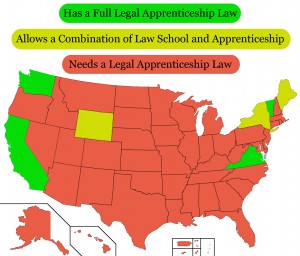
State-by-State Guide to Apprenticeships
Here is some basic information about eight states’ rules for bar admission for apprentices. Please see each state’s bar admissions rules for additional details and information on how to register as an apprentice.
California: California’s complete bar admission rules are at this link. Requires 4 years of study in a law office, at least 18 hours per week, 5 hours of direct supervision, monthly exams, bi-annual progress reports to the CA State Bar. Supervising attorney must have 5 years of active law practice in the state.
Vermont: Vermont’s Law Office Study Program rules are at this link. The program requires 4 years of supervision by a judge or attorney. Supervising attorney must have 3 years of experience.
Virginia: Virginia’s complete Law Reader Program rules are at this link. Requires 3 years of law office study, 40 weeks per year, 25 hours per week, with 3 hours per week of direct supervision by attorney. Supervising attorney must have at least 10 years of experience. Note that the apprentice may not be employed by or compensated by the supervising attorney.
Washington: Washington’s complete bar admission rules are at this link. The Admission to Practice Rule (APR) 6 Law Clerk Program requirements can be found here. Requires 4 years of employment in a law office, an average of 32 hours of work/study per week, 3 hours per week of direct attorney supervision. Supervising attorney must have 10 years of experience. Apprentices must pay an annual fee of $1,500. Note that the apprentice must be employed by the attorney.
States requiring some law school, but not the full three years:
Maine: Maine’s complete bar admission rules are at this link. See Rule 10(c)(5). Maine requires at least two years of law school study, followed by one year of study in a law office.
New York: New York’s complete bar admission rules are at this link. See Section 520.4. New York requires at least one year of law school. The remaining law study may be done in a law office, so long as there is an aggregate of four years of law school study and law office study.
* Wyoming: Unfortunately Wyoming updated their bar admission rules in 2015, eliminating the law office study program. Until then, Wyoming required 1 year of law school and 2 years of a law study program, or 2 years of law school and 1 year of a law study program to be eligible to take the state bar exam.
And the very limited circumstances in which law office study is relevant in West Virginia:
West Virginia: A person who has attended 3 years of law school at a non-ABA-accredited law school in a state where attendance at such school would make the person eligible to take the bar exam in that state may become eligible to take the West Virginia bar exam by doing an additional three years of law office study.The updated rules (as of January 1, 2013) are in Rule 3.0(a)(2)(a) at this link. Note that, as of July 2014, the Rules for Admission to Practice Law on the West Virginia Judiciary website have not been updated. If you read the old rules on that site, you could conclude that West Virginia requires no legal education whatsoever (thanks to the confusing appearance of the word “or”).
1 Trackback / Pingback
Copyright © 2025 | MH Purity lite WordPress Theme by MH Themes

Leave a comment
You must be logged in to post a comment.